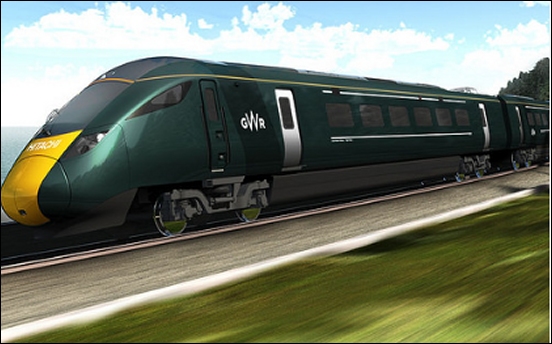Rail passengers are set to benefit from better and faster journeys after the government gave the go-ahead for a brand new fleet of trains running between London and Cornwall.
The deal will allow First Great Western to buy 29 new long-distance trains to serve the south west from 2018.
The state-of-the-art trains, pictured here, will have up to 24% more seats compared to the majority of the trains serving the route today, creating more than 1,000 additional peak-time seats every day.
The privately funded £360 million fleet, which will be manufactured by Hitachi, will also cut journey times.
The trains, which are more powerful, greener and more efficient than the current fleet, will replace the existing 40-year-old trains on the route.
First Great Western put forward the plans for the new trains as part of the deal with the government, announced in March, that sees the operator continue to run services between London Paddington, the Cotswolds, South Wales and the South West until April 2019.
First Great Western Deputy Managing Director, Andrew Mellors, said: “We warmly welcome the announcement today that our recommendations to introduce a new fleet of trains to serve customers between Devon and Cornwall and London have been approved by the Department for Transport.
“We know how important the railway is to the economies and communities of the south west, and today’s agreement is fantastic news for the region and the rail industry as a whole. These trains will help us deliver faster, more frequent services in the south west, and create an additional 1,000 peak-time seats a day for customers on the route.”
The trains, which are capable of operating on both non-electric and electric routes, are similar in design to Hitachi’s new Intercity Express trains.
Rail minister Claire Perry said: “These new trains will make a real difference to the millions of commuters, business travellers and tourists who use this route every year. This industry initiative goes hand-in-hand with the work this Government is doing to reverse decades of underinvestment in transport infrastructure in regions like the south west. This will not only mean better journeys for customers, it will also help to secure long-term economic growth across the country. Like the new IEP trains serving cities in the North of England, this new fleet will help to open up the region for investment.”







